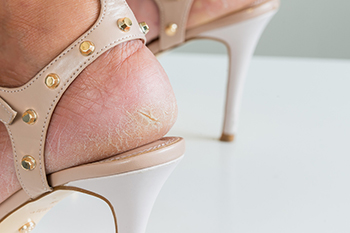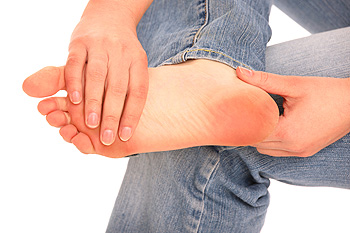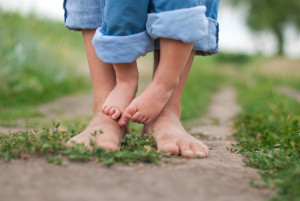Blog
What Are the Affects Cracked Heels Have on the Skin?
 There are two layers of skin that are called the dermis and epidermis. The latter is the outermost layer, and is where cracked skin often develops. Heel fissures is the medical name for cracked heels, which can come from standing on hard surfaces for the majority of the day. Additionally, wearing shoes that do not fit correctly may cause this condition to occur, and this can include wearing shoes that have an open back. There are medical conditions that may lead to cracked heels, such as diabetes, psoriasis and eczema. Patients have found mild relief when the feet are washed and thoroughly dried, followed by applying a good moisturizer to them. If you have cracked heels, it is suggested that you consult with a podiatrist who can effectively treat this ailment, and advise you on proper foot care techniques.
There are two layers of skin that are called the dermis and epidermis. The latter is the outermost layer, and is where cracked skin often develops. Heel fissures is the medical name for cracked heels, which can come from standing on hard surfaces for the majority of the day. Additionally, wearing shoes that do not fit correctly may cause this condition to occur, and this can include wearing shoes that have an open back. There are medical conditions that may lead to cracked heels, such as diabetes, psoriasis and eczema. Patients have found mild relief when the feet are washed and thoroughly dried, followed by applying a good moisturizer to them. If you have cracked heels, it is suggested that you consult with a podiatrist who can effectively treat this ailment, and advise you on proper foot care techniques.
Cracked heels are unsightly and can cause further damage to your shoes and feet. If you have any concerns, contact one of our podiatrists from Pennsylvania. Our doctors can provide the care you need to keep you pain-free and on your feet.
Cracked Heels
Cracked heels appear unappealing and can make it harder for you walk around in sandals. Aside from looking unpleasant, cracked heels can also tear stockings, socks, and wear out your shoes. There are several methods to help restore a cracked heel and prevent further damage.
How Do You Get Them?
Dry skin is the number one culprit in creating cracked heels. Many athletes, walkers, joggers, and even swimmers suffer from cracked heels. Age and skin oil production play a role to getting cracked heels as well.
Promote Healing
Over the counter medicines can help, especially for those that need instant relief or who suffer from chronic dry feet.
Wear Socks – Wearing socks with medicated creams helps lock in moisture.
Moisturizers – Applying both day and night will help alleviate dryness which causes cracking.
Pumice Stones – These exfoliate and remove dead skin, which allows for smoother moisturizer application and better absorption into the skin.
Change in Diet
Eating healthy with a well-balanced diet will give the skin a fresh and radiant look. Your body responds to the kinds of food you ingest. Omega-3 fatty acids and zinc supplements can also revitalize skin tissue.
Most importantly, seek professional help if unsure how to proceed in treating cracked heels. A podiatrist will help you with any questions or information needed.
If you have any questions, please feel free to contact one of our offices located in Plymouth Meeting and Ambler, PA . We offer the newest diagnostic and treatment technologies for all your foot care needs.
Why Do I Get Foot Cramps?
Foot cramps are spasms that occur in the muscles of the feet, most typically on the top of the foot, in the arch, and surrounding the toes. These spasms can be quite painful and may even lock your muscles and prevent movement until they subside. Foot cramps that occur occasionally are likely no cause for alarm, but if they are chronic and interfere with your ability to perform daily functions, you should go see a podiatrist to have them diagnosed. Possible causes of foot cramps can include dehydration, which starves muscles and causes them to malfunction, tight shoes that cut off circulation and restrict movement, peripheral neuropathy (nerve damage), certain medications, and excessive exercising which strains the foot muscles. Additionally, insufficient amounts of potassium in your body—which controls nerve and muscle cell functionality—may contribute to foot cramping. If foot cramps are becoming frequent or more severe, contact a podiatrist.
Foot Pain
Foot pain can be extremely painful and debilitating. If you have a foot pain, consult with one of our podiatrists from Pennsylvania. Our doctors will assess your condition and provide you with quality foot and ankle treatment.
Causes
Foot pain is a very broad condition that could be caused by one or more ailments. The most common include:
- Bunions
- Hammertoes
- Plantar Fasciitis
- Bone Spurs
- Corns
- Tarsal Tunnel Syndrome
- Ingrown Toenails
- Arthritis (such as Gout, Rheumatoid, and Osteoarthritis)
- Flat Feet
- Injury (from stress fractures, broken toe, foot, ankle, Achilles tendon ruptures, and sprains)
- And more
Diagnosis
To figure out the cause of foot pain, podiatrists utilize several different methods. This can range from simple visual inspections and sensation tests to X-rays and MRI scans. Prior medical history, family medical history, and any recent physical traumatic events will all be taken into consideration for a proper diagnosis.
Treatment
Treatment depends upon the cause of the foot pain. Whether it is resting, staying off the foot, or having surgery; podiatrists have a number of treatment options available for foot pain.
If you have any questions, please feel free to contact one of our offices located in Plymouth Meeting and Ambler, PA . We offer the newest diagnostic and treatment technologies for all your foot care needs.
Can Children Develop Toenail Fungus?
While onychomycosis (toenail fungus) is a common condition, it can be rare among infants and children. This is because children’s nails are smaller and grow faster—making their toenails less hospitable to the fungus. However, when pediatric onychomycosis occurs, it should be dealt with swiftly and properly, as it is not good for a child to have any type of infection. Of course, prevention is always the best option, and something that should be highlighted as most children contract onychomycosis from someone in their own home. Don’t share toenail clippers, soap, towels or other personal grooming items with your child. Encourage them to keep their feet clean and dry, and to always wear clean socks and shoes, as well as flip-flops in public showers, locker rooms and around pools. If your child does develop toenail fungus, understand that what may be appropriate treatment for an adult, may not be safe for a child. If your child’s nails are thickened, brittle, crumbling, or yellowish, bring them to a podiatrist to receive an accurate diagnosis and proper treatment.
Making sure that your children maintain good foot health is very important as they grow. If you have any questions, contact one of our podiatrists of Pennsylvania. Our doctors can provide the care you need to keep you pain-free and on your feet.
Keeping Children's Feet Healthy
Having healthy feet during childhood can help prevent medical problems later in life, namely in the back and legs. As children grow, their feet require different types of care. Here are some things to consider...
Although babies do not walk yet, it is still very important to take care of their feet.
Avoid putting tight shoes or socks on his or her feet.
Allow the baby to stretch and kick his or her feet to feel comfortable.
As a toddler, kids are now on the move and begin to develop differently. At this age, toddlers are getting a feel for walking, so don’t be alarmed if your toddler is unsteady or ‘walks funny’.
As your child gets older, it is important to teach them how to take care of their feet.
Show them proper hygiene to prevent infections such as fungus.
Be watchful for any pain or injury.
Have all injuries checked by a doctor as soon as possible.
Comfortable, protective shoes should always be worn, especially at play.
If you have any questions please feel free to contact one of our offices located in Plymouth Meeting and Ambler, PA . We offer the newest diagnostic and treatment technologies for all your foot and ankle needs.
Can Foot Pain Be Avoided During Pregnancy?
 Swollen feet are a common ailment among pregnant women. As their belly grows so does the baby, and with this the feet tend to become bigger. This may be a result of thickened blood that develops during pregnancy, in addition to standing on the feet for most of the day. Research has indicated there are several different things that can be done to help alleviate foot pain during pregnancy. It is beneficial to elevate the feet as often as possible, as this may help to reduce existing swelling. Additionally, it can help to flex and point the feet at various times during the day to help improve circulation. Patients may see a noticeable difference in choosing shoes that are wide and have a low heel. Wearing cotton socks can help to avoid sweating and may improve comfort. If you would like more information about how to avoid foot pain during pregnancy, please consult with a podiatrist.
Swollen feet are a common ailment among pregnant women. As their belly grows so does the baby, and with this the feet tend to become bigger. This may be a result of thickened blood that develops during pregnancy, in addition to standing on the feet for most of the day. Research has indicated there are several different things that can be done to help alleviate foot pain during pregnancy. It is beneficial to elevate the feet as often as possible, as this may help to reduce existing swelling. Additionally, it can help to flex and point the feet at various times during the day to help improve circulation. Patients may see a noticeable difference in choosing shoes that are wide and have a low heel. Wearing cotton socks can help to avoid sweating and may improve comfort. If you would like more information about how to avoid foot pain during pregnancy, please consult with a podiatrist.
Pregnant women with swollen feet can be treated with a variety of different methods that are readily available. For more information about other cures for swollen feet during pregnancy, consult with one of our podiatrists from Pennsylvania. Our doctors will attend to all of your foot and ankle needs.
What Foot Problems Can Arise During Pregnancy?
One problem that can occur is overpronation, which occurs when the arch of the foot flattens and tends to roll inward. This can cause pain and discomfort in your heels while you’re walking or even just standing up, trying to support your baby.
Another problem is edema, or swelling in the extremities. This often affects the feet during pregnancy but tends to occur in the later stages.
How Can I Keep My Feet Healthy During Pregnancy?
- Wearing orthotics can provide extra support for the feet and help distribute weight evenly
- Minimize the amount of time spent walking barefoot
- Wear shoes with good arch support
- Wear shoes that allow for good circulation to the feet
- Elevate feet if you experience swelling
- Massage your feet
- Get regular, light exercise, such as walking, to promote blood circulation to the feet
If you have any questions please feel free to contact one of our offices located in Plymouth Meeting and Ambler, PA . We offer the newest diagnostic and treatment technologies for all your foot and ankle needs.


